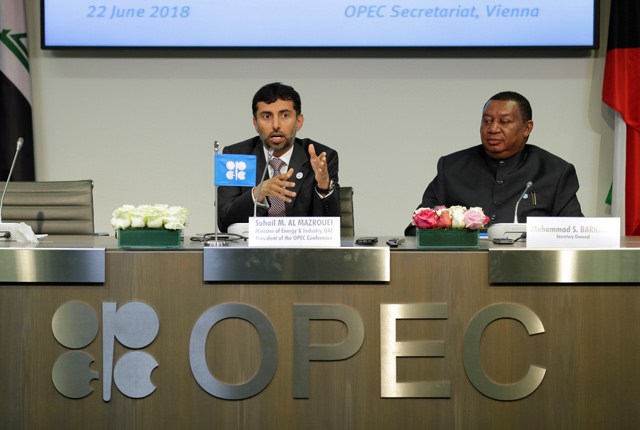VIENNA — The Organisation of the Petroleum Exporting Countries (OPEC) agreed with Russia and other oil-producing allies on Saturday to raise output from July, with Saudi Arabia pledging a “measurable” supply boost but giving no specific numbers.
OPEC had announced an OPEC-only production agreement on Friday, also without clear output targets. Benchmark Brent oil rose by $2.5 or 3.4 per cent on the day to $75.55 a barrel.
On Saturday, non-OPEC oil producers agreed to participate in the pact but a communique issued after their talks with the Vienna-based group provided no concrete numbers amid deep disagreements between OPEC arch-rivals Saudi Arabia and Iran.
US President Donald Trump was among those wondering how much more oil OPEC would deliver. “Hope OPEC will increase output substantially. Need to keep prices down!” Trump wrote on Twitter after OPEC announced its Friday decision.
The United States, China and India had urged oil producers to release more supply to prevent an oil deficit that could undermine global economic growth.
OPEC and non-OPEC said in their statement that they would raise supply by returning to 100 per cent compliance with previously agreed output cuts, after months of overproduction.
Saudi Energy Minister Khalid Al Falih said OPEC and non-OPEC combined would pump roughly an extra 1 million barrels per day (bpd) in coming months, equal to 1 per cent of global supply.
Top global exporter Saudi Arabia will increase output by hundreds of thousands of barrels, he said, with exact figures to be decided later.
Russian Energy Minister Alexander Novak said his country would add 200,000bpd in the second half of this year.
Asked to what extent the decision to increase supply had been driven by pressure from Trump, Novak said: “It is obvious that we are not being driven by Tweets but base our actions on deep market analysis.”
Iran, Saudi disagreement
Iran, OPEC’s third-largest producer, had demanded OPEC reject calls from Trump for an increase in oil supply, arguing that he had contributed to a recent rise in prices by imposing sanctions on Iran and fellow member Venezuela.
Trump slapped fresh sanctions on Tehran in May and market watchers expect Iran’s output to drop by a third by the end of 2018. That means the country has little to gain from a deal to raise output, unlike Saudi Arabia.
Iranian Oil Minister Bijan Zanganeh said the real increase could amount to as little as 500,000bpd because Saudi Arabia would not be allowed to pump more on behalf of Venezuela, where output has collapsed in recent months.
“Each country which has produced less [than its allocation] can produce more. Those which cannot, will not... This means that Saudi Arabia can increase its production by less than 100,000bpd,” Zanganeh told Argus Media.
But Falih said pro-rata quota reallocations did not have to be strict, meaning Saudi wanted to fill the gaps left by others.
“Some of the countries... are not going to be able to produce, so the others will. And that implies there will be indirectly a reallocation,” Falih said.
He also said OPEC could hold an extraordinary meeting before its next formal talks due on December 3 or adjust deliveries in September, when its monitoring committee meets, if global oil supply fell further because of sanctions on Iran.
OPEC and its allies have since last year been participating in a pact to cut output by 1.8 million bpd. The measure had helped rebalance the market in the past 18 months and lifted oil to around $75 per barrel from as low as $27 in 2016.
But unexpected outages in Venezuela, Libya and Angola have effectively brought supply cuts to around 2.8 million bpd in recent months.
Falih has warned the world could face a supply deficit of up to 1.8 million bpd in the second half of 2018.
“Both Saudi and Iran can show that they won,” an OPEC delegate said.
“Zanganeh can go back to his country and say ‘I won’, because we are keeping the original agreement unchanged. Falih can go back and say ‘we will be able to raise production to meet market needs’.”
The United States, which rivals Russia and Saudi Arabia for the position of world No.1 oil producer, is not participating in the supply pact.
